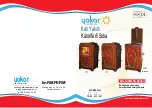
Osburn 900 Installation and Operation Manual
______________________________________________________________________________ 21
4.4.6
BUILDING DIFFERENT FIRES FOR DIFFERENT NEEDS
Using the air control is not the only way to match the stove’s heat output to the heat demand. Your
house will need far less heat in October than in January to be kept at a comfortable temperature. If
you fill the firebox full in fall weather, you will either overheat the space or turn the stove down so
much that the fire will be smoky and inefficient. Here are some suggestions for building fires to
match different heat demand.
4.4.6.1
Small Fires to Take the Chill Off the House
To build a small fire that will produce a low heat output, use small pieces of firewood and load them
crisscross in the firebox. The pieces should be only 3” to 4” in diameter. After raking the coals, you
can lay two pieces parallel to each other corner to corner in the firebox and lay two more across
them in the other direction. Open the air control fully and only reduce the air after the wood is fully
flaming. This kind of fire is good for mild weather when you are around to tend the stove and should
provide enough heat for four hours or more. Small fires like this are a good time to use softer wood
species so there will be less chance of overheating the house.
4.4.6.2
Long Lasting Low Output Fires
Sometimes you will want to build a fire to last up to eight hours, but don’t need intense heat. In this
case use soft wood species and place the logs compactly in the firebox so the pieces are packed
tightly together. You will need to fire the load hot for long enough to fully char the log surfaces
before you can turn the air down. Make sure the fire is flaming brightly before leaving the fire to
burn.
4.4.6.3
High Output Fires for Cold Weather
When the heat demand is high during cold weather, you’ll need a fire that burns steadily and
brightly. This is the time to use your biggest pieces of hardwood fuel if you have it. Put the biggest
pieces at the back of the firebox and place the rest of the pieces compactly. A densely built fire like
this will produce the longest burn your stove is capable of.
You will need to be cautious when building fires like this because if the air is turned down too much,
the fire could smoulder. Make sure the wood is flaming brightly before leaving the fire to burn.
















































